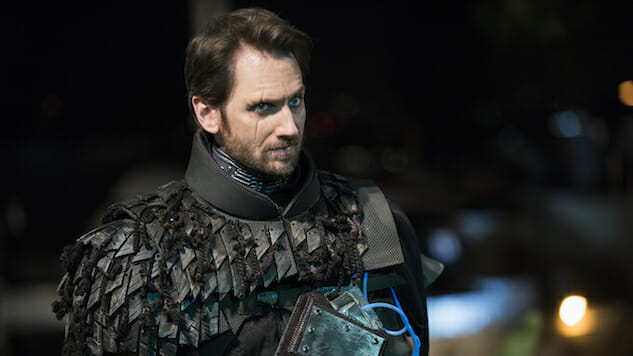Why Future Man Owes Its Great First Season to Derek Wilson
Photo: Brandon Hickman/Hulu
The weirder your show, the more likely it is that a side character boosts it toward greatness. When there’s less focus on the prestige of it all or building up the bonds of sitcom stars for primetime sexiness, the idiosyncratic characters—likely the writers’ favorite characters to write jokes for—can steal the spotlight and become almost instant breakouts. I’m thinking most recently of Janet (D’Arcy Carden), the omnipotent anthropomorphic database from The Good Place, and Ron Swanson (Nick Offerman) from Parks and Recreation, but the same idea can be applied to the first season of Hulu’s sci-fi weirdness, Future Man. In it, there is a badass military man from an apocalyptic future where his kind must live in the sewers and eat rats. His name is Wolf, he is played by Derek Wilson, and he is one of the best TV creations of the year.
Future Man takes a bit to get going. It’s a series executive produced and partially directed by Seth Rogen and Evan Goldberg, so it’s their brand of strange, silly, R-rated kids content (think of all the references in This Is the End) applied to time travel, the apocalypse, and other great science fiction subjects of (but not limited to) the 1980s. The pilot episode features Josh Futturman (Josh Hutcherson) completing the last level of his favorite video game, which turns out to be a recruitment tool sent from the future. This is a future run by perfect Biotics (a fear of anyone in any minority, let alone a loser janitor like Futterman), the flawed, human resistance to which is made up of a bunch of subterranean Mad Max machos.
The set-up is so tired that the show has to call attention to it, and the loser-done-good trope is as simplistic as you can get, but as the season progresses to the genre’s more exciting aspects (including the spectacular time travel episode “Herpe: Fully Loaded,” which manages to nail a racial tension/humor divide), it gives itself more chances to exhale and expand its weirdness. As good as Hutcherson is as the charming fuck-up everyman, his real skill is being a straight man to the one-two combo of Wolf and Tiger (Eliza Coupe), the two resistance fighters sent back to find the savior that beat their game. The safe protagonist, like the safe plot, is pure set-up, allowing the real, bizarro series stars to shine through.
The pilot, for all its expository trappings, also feels a little safe from Rogen and Goldberg. They’ve been getting more and more confident with their films, but their impulse is to stick with loose ramble sessions to lower our guard and then hit us with an outrageous punchline. There’s a place for that in the mix of realism and genre they’ve constructed here, but it’s far more entertaining when they let their premises go wild as the season unfolds. The best of their premises is that of Thor, Terminator 2: Judgement Day, and countless others: Let’s have an intimidatingly musclebound stranger interpret our world.
The show uses Wilson’s razor jaw and constant scruff (along with a cartoonish scar and eyeliner) to make all those jokes about strong alien/gods/robots not understanding puny Earth society the on-going comic relief. A small diner scene between Wilson and a pickle is instantly classic, with the kind of fish-out-of-water comedy reactions (Wilson’s stunned wonder at a pickle) that need real acting chops to sell their humor. Without his performance, there’s a funny line about someone misidentifying a pickle. With it, we have a character moment that displays awe, suffering in a character’s past, openness to his new world’s pleasure, and an undermining of the emotionless hardass he’d been up until that point… in a scene about eating a pickle.
-

-

-

-

-

-

-

-

-

-

-

-

-

-

-

-

-

-

-

-

-

-

-

-

-

-

-

-

-

-

-

-

-

-

-

-

-

-

-

-








































